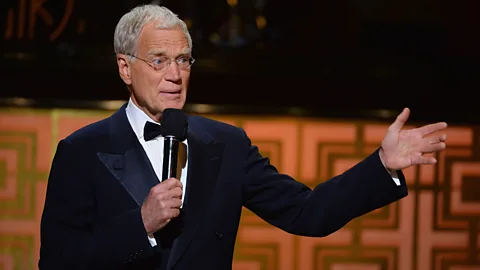David Letterman: The man who changed TV forever
 Getty Images
Getty ImagesThe comedy legend signs off from US TV after 33 years on the air this week. Without him there would be no Jon Stewart or Stephen Colbert, writes Keith Uhlich.
I was four years old when Late Night With David Letterman premiered on 1 February 1982. There was no way I could have watched it, nor, I suspect, would I have had much interest in doing so. Witching-hour talk shows weren’t on the radar of a boy into Saturday morning cartoons and Star Wars. Yet I can’t recall a time when I wasn’t at least aware of the show’s gap-toothed host, a contemporary of mine in the sense that he cultivated his celebrity while I came of age. Other US TV hosts like comedians Johnny Carson and Jack Paar were already institutions. But Letterman was the new kid on the block, invigorating the format with his own oddball sense of humour, and lending it an abrasive edge that pushed back against Carson and Paar’s audience-ingratiating gentility. A medium that had been relentlessly ‘nice’ would never be the same. Even across the Atlantic, TV hosts were taking notice: in 1987 Jonathan Ross would pattern The Last Resort, his UK TV programme, on Late Night. But being the rebellious upstart would only last for so long. Letterman would quickly become an icon himself – for better and for worse.
Looking back at that first show from the perspective of today, it’s clear Letterman and his team knew they had to provide context about what was to unfold. Carson may have given the audience for his programme, The Tonight Show, a few riotous gooses between celebrity interviews via quirky characters like Art Fern and Carnac the Magnificent – to say nothing of the tomahawk-to-the-groin blooper that remains one of the most famous moments in the history of US TV comedy. But anarchy was a digression on The Tonight Show, not the norm.

From the start, Letterman took a much more unabashed, ‘anything goes’ approach: the first person on screen in the initial episode isn’t even Dave himself but helium-voiced Late Night staple Larry “Bud” Melman, riffing on Boris Karloff’s version of Frankenstein as he offers “a word of friendly warning” about what we’re about to see. Then the image dissolves to a bevy of girls in peacock headdresses (the peacock being the mascot of Late Night’s home network, NBC) dancing to a disco rendition of Tchaikovsky’s Piano Concerto No 1. Eventually, they pause and introduce, in endearingly awkward fashion, “a man who shouldn’t be up this late… David Letterman!” It feels like an eternity before Dave emerges through that sea of feathers, and he already emanates the to-hell-with-it-all demeanor that would become his stock in trade. Is he laughing to himself or just plain irritated? Part of the fun is never knowing which.
An after-hours attitude
Letterman had his break after several years honing his style as a stand-up comic and occasional on-air personality. In the early 1970s, he was a weatherman for a TV station in his hometown of Indianapolis, and became known for his sardonic asides about climate patterns. (One clip has him claiming bad weather has erased the border between Indiana and Ohio. “Personally, I’m against it,” he jokes.) He eventually moved with his wife to California where he performed at the legendary Comedy Store alongside his future nemesis Jay Leno. Eventually he caught the eye of some of Carson’s talent scouts and quickly became one of The Tonight Show’s regular guests, as well as a frequent guest host. A brief morning show for NBC followed; it lasted only a few months due to low ratings, but won two Emmy Awards.

Around that time, Carson was involved in some testy contract negotiations with NBC. As part of the deal that was eventually hashed out, he was granted the rights to the hour-long timeslot immediately following The Tonight Show. Both Carson and the NBC brass held Letterman in high regard, and the network was looking to cater to a young male demographic for which the unpredictable 34-year-old comedian seemed a perfect fit. Carson and his production company’s level of control was such that Letterman couldn’t replicate several Tonight Show staples (no Ed McMahon-like sidekick; no characters like Carnac). Yet these limitations on what became Late Night freed Letterman up to rework the formula for hosting an after-hours comedy show into something much looser, and willfully irreverent.

But the moment I became a real Letterman fan coincided with the moment he became an institution. It was impossible to avoid his fight with Jay Leno for The Tonight Show after Carson announced his retirement, and it felt like picking a side was essential. Letterman seemed the obvious choice to my high school self – so much more of an authentic rebel than the obsequious Leno. And my allegiance became more pronounced after Leno did get the Tonight gig and Dave became, to my eyes and many others’, the underdog cruelly denied his birthright.

He came roaring back, of course, splitting from NBC for a much more lucrative payday at CBS, changing the title of his programme from Late Night to Late Show and moving production into the New York theatre that once housed another chatterbox icon, Ed Sullivan. Now able to stay up past my bedtime, I watched the Late Show premiere on 30 August 1993, and stayed around for numerous subsequent episodes. That first installment was electric, the studio audience giving a rousing standing ovation; Bill Murray, the first guest, as he had also been on Late Night, spray-painting Dave’s new desk; and a general air of triumph-against-adversity that was reflected, at least for a time, in the ratings.
From outsider to insider
But having gotten the brass ring, where was there to go? Letterman’s shtick, given a larger platform, slowly began to lose its appeal. Many pundits point to his widely panned Academy Awards hosting engagement in 1994 as the start of a slide, though I personally think he gave his all to that impossible gig at which no host ever really succeeds. There did seem to be something that broke, though. He’d been doing this long enough, and his position was secure enough, that he could afford to coast. And like a petulant teenager, I rebelled against this middle-aged man who suddenly seemed out of step.
It was unfair of me. Though I do think there are ways in which Letterman changed for the worse – embracing his innate crankiness to a damagingly smug degree, especially with guests he didn’t like – his influence and example did open doors. It’s hard to imagine Jon Stewart’s politically-charged sarcasm or Stephen Colbert’s character-based satire without Dave’s irony-soaked, writer-driven sensibility: impulsive yet disciplined. And as I got over my own teen and early 20-something bitterness, it was easier to appreciate what Letterman did uniquely well – not just his dadaist sense of humour expressed through willfully banal gags like Stupid Pet and Human Tricks, but his at times bracing honesty. He was truly sincere when it came to addressing his quintuple bypass surgery in 2000 –he brought his doctors onstage and nearly broke down with gratitude – and was bluntly direct in 2009 when he addressed the rumours of affairs he had with several female staffers. And, of course, every chance he got to poke back at Leno was gold.

In the run-up to his final show on 20 May, Letterman seems to have a renewed vitality. Knowing the end is near, even this most irascible of personalities is trying to cherish the moment. So he’s shared another of his many kisses with Julia Roberts, pow-wowed with Presidents Obama and Clinton, gotten serious with Dr Cornel West, been serenaded by Adam Sandler, traded barbs with Howard Stern and Don Rickles and even had long-term bandleader Paul Shaffer take the interviewees’ seat for some wistful reminiscences. This is the victory lap, the capstone to 33 years of highs, lows and everything in between. I wasn’t around for all of it, but it was nice to know that, even at my most dismissive, Dave was there doing his thing.
No longer. Everything must end. Everyone must go. But attention must be paid to this man who changed comedy forever. David Letterman will be missed, and in these last few days, this critic and fan will be in front of his television to thank him and wish him well.
